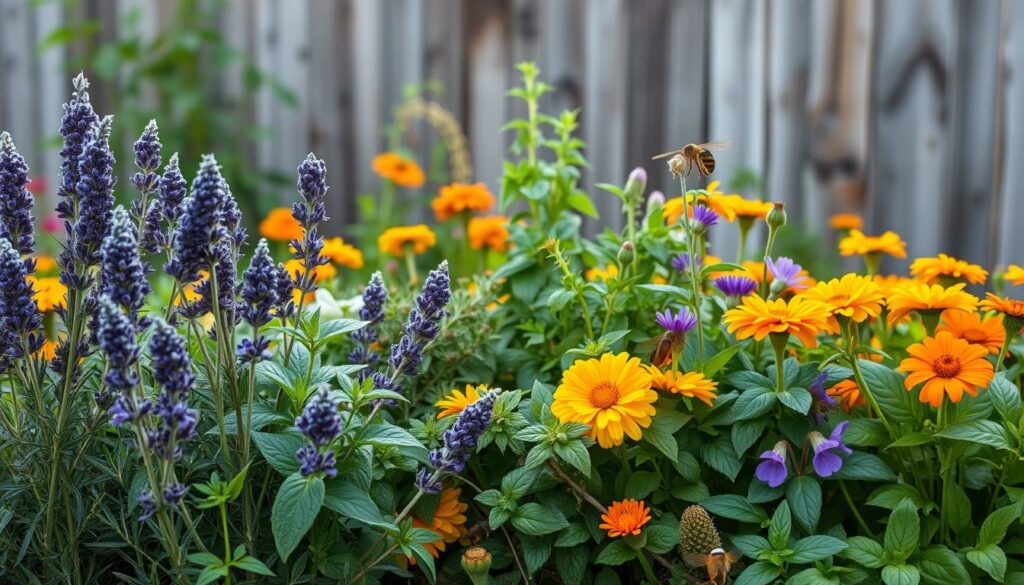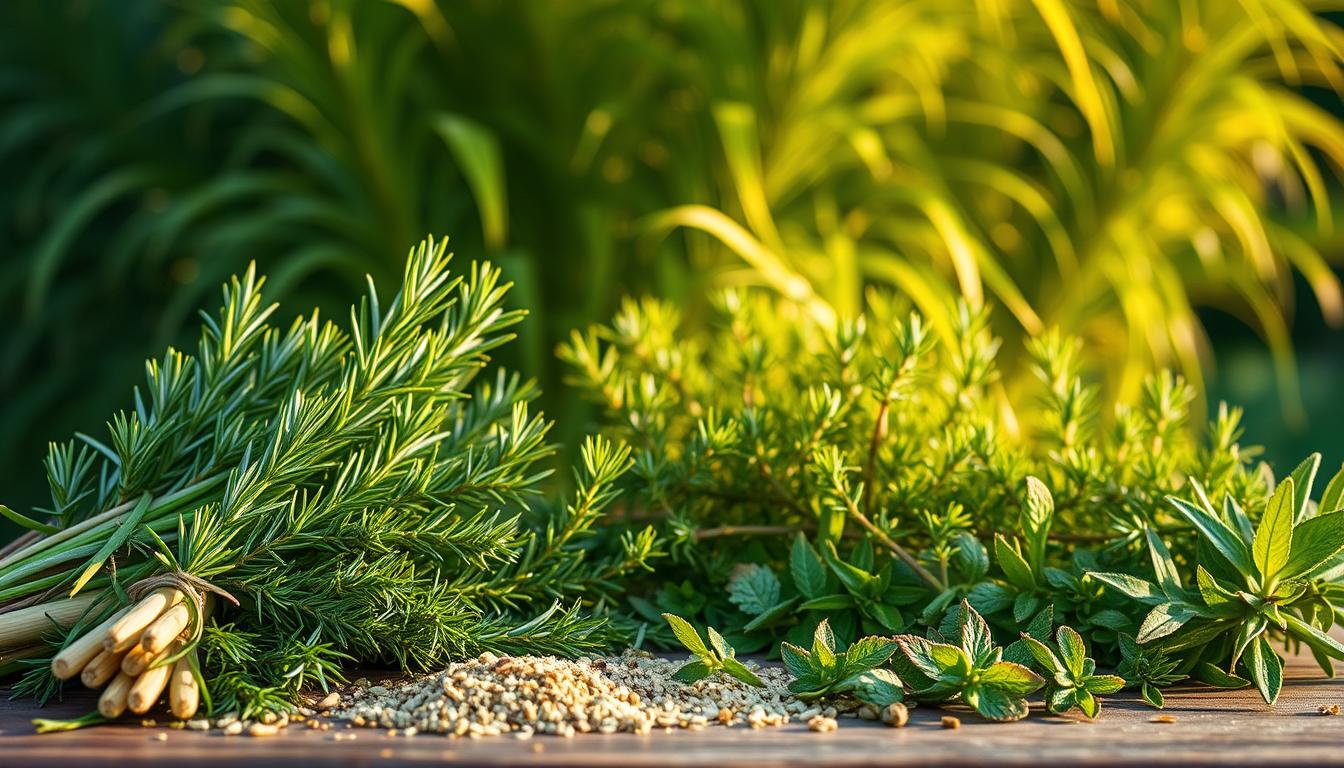Effective Herbs to Repel Bugs Naturally
Enjoying the outdoors can quickly turn bad if pests show up. It’s important to find a effective and natural way to keep bugs away.
Using certain herbs is a great solution. These insect-repelling plants keep your space pest-free without harsh chemicals. Adding these natural bug repellents to your decor lets you enjoy fresh air without bugs.
Key Takeaways
- Discover the most effective herbs for repelling bugs naturally.
- Learn how to incorporate these herbs into your outdoor spaces.
- Understand the benefits of using natural bug repellents.
- Explore how these insect-repelling plants can enhance your outdoor experience.
- Find out how to maintain a pest-free environment without harsh chemicals.
Why Natural Herb Repellents Are Better Than Chemical Options
Many of us are now using natural herb repellents to keep bugs away. These repellents are safer than chemical products. They repel pests without the bad side effects of chemicals.
Natural herb repellents have been around for centuries. They use plants’ natural properties to keep insects away. Mosquito-repelling herbs, for example, have oils that mosquitoes don’t like.
The Science Behind Plant-Based Bug Deterrents
Plants have evolved to protect themselves from insects. They produce chemicals that repel or attract certain insects. This knowledge helps us make effective natural repellents.
Certain herbs release fragrances that confuse mosquitoes. Others have compounds that are toxic to insects. Using these herbs for pest control helps us avoid chemical pesticides.

Environmental and Health Benefits of Herbal Solutions
Natural herb repellents are good for the environment and our health. They are biodegradable and non-toxic. This means less pollution and fewer health risks.
- Reduced chemical exposure: Herbal repellents use fewer chemicals.
- Eco-friendly: They are made from renewable resources.
- Cost-effective: You can grow many pest-control herbs at home.
Choosing natural herb repellents helps protect us and the planet. As we learn more about mosquito-repelling herbs and other plants, we’ll find better ways to control bugs.
Herbs That Repel Bugs: A Comprehensive Guide
Nature has given us many herbs that can effectively repel bugs. We’re here to show you which ones. Enjoying the outdoors can be ruined by bugs. But, some herbs naturally keep them away, making your space bug-free.

Mosquito-Repelling Powerhouses
Mosquitoes are more than just a bother; they can spread diseases. Luckily, some herbs keep them away. Citronella and lemon balm are top choices. Citronella’s citrus smell is often used in bug sprays. Lemon balm’s citrusy scent is also unappealing to mosquitoes.
Lavender and rosemary also keep mosquitoes away. Their oils repel these pests. Planting them in your garden or pots can cut down on mosquitoes.
Herbs That Keep Flies and Gnats Away
Flies and gnats can be as annoying as mosquitoes. Mint and pennyroyal are great for repelling them. Mint’s scent keeps flies and gnats away. Pennyroyal’s strong smell is especially good against flies.
Basil also keeps flies away. Its scent is nice for people but bad for flies. Having basil in your garden or near your dining area can help.
Multi-Purpose Pest-Repelling Herbs
Some herbs repel many pests, making them great for any space. Sage and thyme are perfect examples. Sage’s scent keeps many insects away. Thyme’s aroma repels pests without overpowering your garden.
Adding these bug deterrent herbs to your garden or outdoor areas makes it more enjoyable. They help keep mosquitoes, flies, and gnats away.
Growing Your Bug-Repelling Herb Garden
To make your natural bug repellent herbs work best, grow them right. A well-planned herb garden is not just pretty. It also keeps bugs away.
Selecting the Optimal Location for Maximum Effectiveness
Think about sunlight and soil when picking a spot for your herbs. Most herbs that keep bugs away need 4-6 hours of sun a day. Make sure the soil drains well to keep your herbs healthy.
Soil Preparation and Planting Techniques
Soil prep is vital for a thriving herb garden. Add compost to make the soil better. Plant herbs with enough space to avoid overcrowding, which can harm their strength and make them more vulnerable to pests.
- Choose herbs that are suitable for your climate.
- Plant at the right time: spring or fall are usually best.
- Water herbs regularly, but avoid overwatering.
Seasonal Maintenance for Potent Aromatic Production
Keep your herbs in top shape to keep bugs away. Prune, fertilize, and protect them from harsh weather. This way, you’ll have a rich harvest of herbs that keep bugs away all season.
With a bit of effort and care, your herb garden will be a beautiful bug barrier. It will make your outdoor space even better.
Strategic Planting Patterns for Maximum Bug Protection
To keep bugs away, you need a good plan for planting bug-repelling herbs. By placing these herbs wisely in your garden or yard, you can make a barrier. This barrier will keep bugs and pests out.
Creating Protective Herbal Borders is a smart way to keep bugs away. Plant a mix of bug-repelling herbs around your property’s edges.
Creating Protective Herbal Borders Around Your Property
To make a protective herbal border, pick herbs that bugs don’t like. Some good choices are:
- Lemongrass
- Basil
- Mint
- Rosemary
- Lavender
Plant these herbs close together along your garden or yard’s edges. This will make a barrier that bugs won’t cross. Keep them well-maintained for best results.
Companion Planting with Vegetables and Flowers
Companion planting is another smart way to keep bugs away. By planting bug-repelling herbs with your veggies and flowers, you create a safe space. This space will keep pests away.
Here are some good examples of companion planting:
- Plant basil with tomatoes to keep whiteflies away
- Plant mint with cabbage to stop aphids
- Plant rosemary with carrots to keep carrot flies off
Container Gardens for Patios, Decks, and Small Spaces
If you have little space, think about a container garden with bug-repelling herbs. It’s a great way to keep bugs off your patio, deck, or small balcony.
For a container garden, pick herbs that grow well in containers. Some good ones are:
- Chives
- Thyme
- Oregano
- Sage
By using these smart planting strategies, you can keep bugs away. This makes your outdoor space more enjoyable.
DIY Herbal Bug Sprays and Repellents
DIY herbal bug sprays and repellents are a natural way to keep bugs away. They use bug deterrent herbs to create safe and effective repellents for you and the environment.
Essential Oil-Based Formulas
Essential oils from bug deterrent herbs like citronella, lemongrass, and peppermint make great bug sprays. Mix 10-15 drops of your chosen essential oil with 1 cup of water and a bit of mild dish soap.
Shake it well and spray it around your outdoor spaces or on your skin (diluted with a carrier oil). Try mixing citronella and lemongrass for a citrus scent or peppermint and eucalyptus for a cool, refreshing blend.
Herbal Infusions and Tinctures
Herbal infusions and tinctures are also great for repelling bugs. To make an infusion, steep fresh or dried herbs like basil, mint, or chamomile in boiling water. Let it cool, then strain and use it as a spray or on your skin.
Tinctures are made by soaking herbs in vodka or glycerin. These concentrated extracts can be used in small amounts to repel bugs. For example, mix a few drops of calendula tincture with water and spray it around your home.
Application Methods and Safety Considerations
When using DIY herbal bug sprays and repellents, follow proper application and safety guidelines. Always dilute essential oils with a carrier oil before applying to your skin. Do a patch test to check for any allergic reactions.
- Reapply bug sprays every few hours or after swimming or sweating.
- Avoid applying bug repellents to broken or irritated skin.
- Keep bug sprays away from children and pets.
By following these safety tips and using bug deterrent herbs wisely, you can enjoy the outdoors without bug bites.
Targeting Specific Pest Problems with Herbs
Herbs are a natural way to fight pests in homes and gardens. By picking the right herbs, you can manage pests without chemicals.
Mosquito and Tick Solutions
Mosquitoes and ticks are more than just a nuisance; they can spread diseases. Some herbs naturally repel these pests. For example, citronella grass and lemon balm keep mosquitoes away. Planting them in your garden or keeping them in pots can help.
To fight ticks, try American beautyberry or garlic around your property. These plants repel ticks, lowering the risk of tick-borne illnesses.
Indoor Pest Control for Ants, Spiders, and Roaches
Indoor pests like ants, spiders, and roaches can be a problem. Certain herbs can keep them away. For example, basil and mint repel ants and spiders. Place pots of these herbs near entry points or where pests are seen.
To control roaches, use catnip or pennyroyal. These herbs have compounds that roaches dislike, keeping them away from your home.
Garden Pest Management for Aphids, Japanese Beetles, and More
Garden pests like aphids and Japanese beetles harm your plants. Herbs like chives and garlic repel these pests. Chives, for instance, improve plant health and deter aphids.
For Japanese beetles, plant rue or tansy near affected areas. These herbs repel Japanese beetles, protecting your garden from their damage.
Creating Herb-Based Bug Barriers Around Your Home
To keep bugs away, use herbs that keep bugs away to create a barrier around your home. Planting these herbs around your property lets you enjoy the outdoors without bugs. This method also makes your environment healthier.
Window Box and Entryway Plantings
Herbs in window boxes and near doors are great for keeping bugs out. Lavender and basil smell nice and keep mosquitoes and flies away. By placing these herbs near windows and doors, you block bugs from getting in.
Patio and Outdoor Living Area Protection
Make your patio and outdoor areas bug-free. Plant natural bug repellent herbs like citronella, lemongrass, or mint. These can be in pots or the ground, keeping bugs away from your patio.
Yard Perimeter Planning for Complete Coverage
For full bug protection, plant herbs around your yard’s edge. Choose a mix of herbs that repel different bugs. A diverse herb border looks good and keeps bugs out. Use herbs like rosemary, thyme, and sage for their bug-repelling powers.
Harvesting and Preserving Herbs for Year-Round Protection
To enjoy your insect-repelling herbs all year, learn how to harvest and preserve them. This way, you’ll always have natural pest control. Your home and garden will stay bug-free.
Optimal Harvesting Techniques to Maintain Plant Vigor
Harvesting herbs at the right time keeps them potent and healthy. The best time is in the morning, after dew but before it gets hot. This preserves the oils that repel insects.
Use sharp scissors or pinch off leaves and stems carefully. This encourages herbs to grow bushy and prevents them from flowering. Flowering can make them less potent.
Drying and Storage Methods
Drying herbs is a great way to keep them for a long time. You can air dry, oven dry, or use a dehydrator. Air drying is simple: just tie herbs in bunches and hang them in a warm, dry spot.
After drying, store herbs in airtight containers. Glass jars with tight lids are perfect. Store them in a cool, dark place to keep their potency.
Creating Dried Herb Sachets, Bundles, and Potpourri
Dried herbs can make sachets, bundles, and potpourri that repel insects. Fill cloth bags with dried herbs, tie them, and hang them where pests are a problem.
Make herb bundles by tying sprigs together with string. Hang them in closets or drawers to keep pests away. For a stronger scent, mix herbs with dried flowers and spices for potpourri.
By using these methods, you can enjoy your insect-repelling herbs all year. Your home and garden will stay pest-free.
Integrating Herbs with Other Natural Bug Deterrents
Using herbs with other natural bug repellents makes a strong pest control system. This mix boosts your bug-fighting power. It makes your outdoor space more comfortable.
Complementary Non-Herbal Plants That Repel Insects
Some non-herbal plants also keep bugs away. For example, marigolds and nasturtiums keep aphids and other pests off. Adding these flowers to your herb garden makes a strong bug-repelling mix.
Think about adding citronella and lemongrass too. They help keep bugs away. You can add them to your garden or use them in pots to fight bugs better.
Physical Barriers and Traps That Work with Herbs
Physical barriers and traps work well with herbs to fight pests. For example, a mosquito net around your outdoor area keeps mosquitoes away.
Sticky traps or bug zappers can catch or kill bugs that herbs can’t repel. Mixing these methods gives you a strong defense against pests.
Building a Complete Natural Pest Management System
To make a full natural pest control system, mix herbs with other natural repellents, barriers, and traps. Start by picking a variety of herbs that repel bugs. Plant them in key spots around your property.
- Pick herbs that repel specific pests, like basil for mosquitoes or mint for ants.
- Add non-herbal plants that repel bugs, like marigolds or citronella.
- Use barriers, like mosquito nets or fine mesh screens, to keep bugs out.
- Think about using traps, like sticky traps or bug zappers, to catch or kill bugs.
By mixing these methods, you can make a strong and effective natural pest control system. It keeps your outdoor spaces comfortable and bug-free.
Living Bug-Free: Making Herbs Part of Your Everyday Life
You now know how to keep bugs away with herbs. By adding natural bug repellent herbs to your daily routine, you can enjoy the outdoors without bugs.
Insect-repelling plants can be used in many ways. You can plant them in your garden or use their essential oils in DIY bug sprays. This way, you can keep bugs away every day.
To keep your home bug-free, plant herbs like basil, lavender, and mint around your property. These plants not only repel bugs but also make your outdoor space beautiful.
By using herbs that repel bugs in your daily life, you can make your living space more comfortable and enjoyable. Start using natural bug repellent herbs today and say goodbye to pesky insects.



